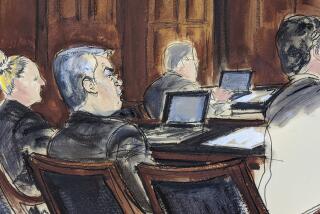Cuba Opens Fraud Trial of Former U.S. Financier Vesco
- Share via
HAVANA — Looking gaunt in a steel-blue prison uniform, Robert Vesco, the onetime financier who has eluded U.S. authorities for almost a quarter of a century, went on trial Thursday in Cuba, the country that was his refuge from American justice.
Charged here with acts against the economy, illegal economic activity and fraud in connection with an alleged attempt to secretly develop and market a miracle drug for cancer and arthritis, Vesco, 60, faces up to 20 years in prison.
The case is strikingly reminiscent of the problems that forced the Detroit native to flee the United States nearly 25 years ago.
Vesco, who allegedly bilked American investors out of $224 million, is now accused of defrauding foreign investors in Cuba at a time when the island nation is desperately trying to attract capital from abroad.
And once again, a Nixon is involved in Vesco’s notoriety: This time it is Donald Nixon, nephew of former President Richard Nixon whose 1972 campaign allegedly received $200,000 in illegal contributions from Vesco.
After more than a year in Cuban jails awaiting trial, with his light brown beard turning gray, Vesco apologized for his inability to speak Spanish after 14 years in Cuba.
He explained his health problems at length and generally presented a far different image from the notorious fugitive who once flaunted his ability to get away with a multimillion-dollar fraud.
He testified for more than six hours as he stood before a five-judge tribunal in an aging building across from a replica of the U.S. Capitol Building in historic Old Havana.
Those present included his wife, Lydia Alfonso, a Cuban trade official who faces related charges and a 10-year sentence.
Their jailhouse wedding early this year and the current trial are the latest twists in a wild career that started to run downhill in 1973, when Vesco fled the United States amid accusations that he had bilked investors out of millions.
U.S. law enforcement chased Vesco through the Caribbean for a decade, always a step behind as he slipped in and out of countries--such as Costa Rica--that do not have extradition treaties with the United States but that often find American pressure hard to resist.
Vesco settled in Cuba almost a decade and a half ago, apparently safe to enjoy his fortune in a country that revels in defying Washington.
He was rumored to have a cordial relationship with Cuban President Fidel Castro, although he said Thursday that “I have never met the president of Cuba. I have never told anybody that I met the president of Cuba.”
In 1989, U.S. authorities added a drug trafficking charge to Vesco’s list of alleged crimes.
But his life appeared to go on undisturbed until May 31, 1995, when he was arrested at his Havana home by more than a dozen police.
Cuban authorities accused him of espionage in connection with the drug TX. It is a plant-based substance discovered by an American doctor.
Its backers have made huge claims for it, asserting that it boosts the body’s immune system and protects it from diseases such as AIDS and cancer.
Vesco learned about the drug from his longtime friend, Donald Nixon, who had been his house guest and business partner for three years.
Nixon was arrested along with Vesco but was released and allowed to return home to California after weeks of interrogation.
In a 20-page indictment, Cuban authorities accuse Vesco of developing TX behind their backs and defrauding foreign investors in a marketing scheme for it.
Vesco’s immigration status did not permit him to work in Cuba.
Vesco said Thursday that Cuban authorities were aware of his efforts to develop the drug. He cited meetings with several mid-level Health Ministry officials to back his claims.
He blamed his legal problems on a third partner, Enrico Garzarolli, an Italian.
Although U.S. officials have expressed interest in seeing Vesco finally face his long-standing U.S. fraud charges, a Cuban Foreign Ministry spokeswoman noted Thursday that no extradition treaty exists between the United States and Cuba and that no formal request has been made for his return.
More to Read
Sign up for Essential California
The most important California stories and recommendations in your inbox every morning.
You may occasionally receive promotional content from the Los Angeles Times.









